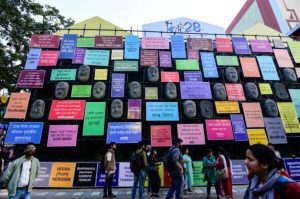South Asian Stories Shine in Kolkata: The 8th edition of the South Asian Film Festival (SAFF) in Kolkata came to a spectacular close this week with a powerful Sri Lankan documentary clinching the coveted Satyajit Ray Bronze Award, an honour named after Bengal’s cinematic legend. As the curtains fell on this week-long cinematic celebration, the festival left behind more than just awards—it reignited conversations around shared regional identity, the power of storytelling, and the future of independent cinema across South Asia.
The event, hosted at Nandan, the cultural heart of Kolkata, drew filmmakers, critics, students, and film lovers from India, Nepal, Bangladesh, Sri Lanka, Bhutan, and the Maldives. It featured over 60 films and documentaries, showcasing both emerging voices and seasoned auteurs.



The Winning Entry: A Portrait of Post-War Resilience
The highlight of the evening was the Sri Lankan documentary “Weaving Silence”, directed by Tharushi Weerasinghe, which won the Satyajit Ray Bronze Award for Best Documentary.
The film explores the lives of Tamil women in post-war Sri Lanka, focusing on how they cope with trauma, rebuild identity, and silently resist through everyday acts—be it embroidery, poetry, or quiet protest.
“We didn’t expect this level of response,” said Weerasinghe in her acceptance speech. “But the fact that Kolkata—the city of Ray, Ghatak, and Sen—honoured our story means a lot.”
The jury, comprising filmmakers from Bangladesh, Bhutan, and India, praised the documentary for its “deep humanism, poetic structure, and powerful political undercurrent.”
South Asian Stories Shine in Kolkata: Festival Highlights
Over the seven days of the festival, SAFF 2025 screened 38 feature films, 22 documentaries, and 6 short films. The theme this year was “Borders and Belonging,” a timely subject in light of political unrest, climate migration, and cultural identity debates in South Asia.
Selected Highlights:
- “Kohra” from Bangladesh: A story of a fisherman whose village disappears due to river erosion.
- “Kalapani” from India: A feature on Andaman’s indigenous tribes and their struggles against tourism.
- “Sita’s Journey” from Nepal: A feminist retelling of the Ramayana through the lens of a migrant woman.
Daily panel discussions were held at the Rabindra Sadan complex, covering topics like:
- Gender and filmmaking
- Representing conflict in cinema
- Challenges of OTT vs traditional distribution in South Asia
- Future of regional co-productions
Award Winners at a Glance
| Category | Winner | Country |
|---|---|---|
| Best Feature Film (Golden Ray) | “Mountain Dust” | Nepal |
| Best Director | Sanjay Perera for “Bitter Harvest” | Sri Lanka |
| Best Documentary (Bronze Ray) | “Weaving Silence” | Sri Lanka |
| Special Jury Mention | “Where the Rivers Sleep” | India |
| Audience Choice Award | “Bhoy” | Bangladesh |
Satyajit Ray’s Legacy and the Bronze Award
Instituted in 2016, the Satyajit Ray Bronze Award commemorates the master filmmaker’s dedication to human stories and regional aesthetics. It aims to honour documentaries that blend craft, courage, and compassion—three traits deeply associated with Ray’s legacy.
The festival screened Ray’s rarely-seen short film “Two” (1964) during the closing ceremony. A panel including Ray’s son Sandip Ray, filmmaker Aparna Sen, and Bangladeshi director Mostofa Sarwar Farooki reflected on how Ray’s humanistic lens continues to influence contemporary South Asian filmmakers.
“This award is not just a token—it’s a call to return to stories that matter,” said Aparna Sen.
A Platform for Marginal Voices
SAFF 2025 stood out for its inclusive programming. For the first time, it featured:
- LGBTQ+ stories from Bhutan and Nepal.
- A special package of indigenous-language films from India’s Northeast.
- Workshops on climate justice filmmaking, sponsored by UNDP and UNESCO India.
Young filmmakers from economically disadvantaged backgrounds were provided free passes, accommodation, and pitching sessions with international producers.
Knowledge-Sharing and Capacity Building
Workshops and masterclasses were central to the festival:
- “Funding Your First Film” by Rina Dasgupta (producer, UK/India)
- “Editing for Impact” by Tenzin Norbu (Bhutan)
- “The Art of the Documentary Interview” by Shahana Begum (Bangladesh)
Over 200 media students from Jadavpur University, Satyajit Ray Film & Television Institute, and NSHM Knowledge Campus participated.
Voices from the Festival
Priyanka Sen, SRFTI student:
“Seeing films from Sri Lanka, Nepal, Bhutan—it makes you realise how similar yet unique our struggles are. It’s healing.”
Tenzing Wangchuk, Bhutanese filmmaker:
“Kolkata has always welcomed voices from the hills, forests, and borders. That’s what cinema is supposed to do—create bridges.”
Related Images
- Festival Poster at Nandan Entry Gate
- Director Tharushi Weerasinghe receiving award
- Panel discussion on ‘Borders in Cinema’
- Audience during open-air screenings
External Links & Official Portals
- South Asian Film Festival Kolkata – Official Page
- West Bengal State Film Academy
- Ministry of Information & Broadcasting
- UNESCO India – Culture Sector
Looking Ahead: What SAFF Means for South Asian Cinema
As political borders harden and streaming algorithms reduce diverse regional stories to “content buckets,” SAFF remains one of the few spaces that prioritises art over commerce, empathy over entertainment.
Festival Director Indrani Roy announced that the 2026 edition will explore “Cinema and the City”, focusing on urban trauma, displacement, and gentrification. For now, SAFF 2025 has reignited the city’s passion for border-crossing stories and renewed Kolkata’s status as the cinematic soul of South Asia.
Also read: Home | Channel 6 Network – Latest News, Breaking Updates: Politics, Business, Tech & More

